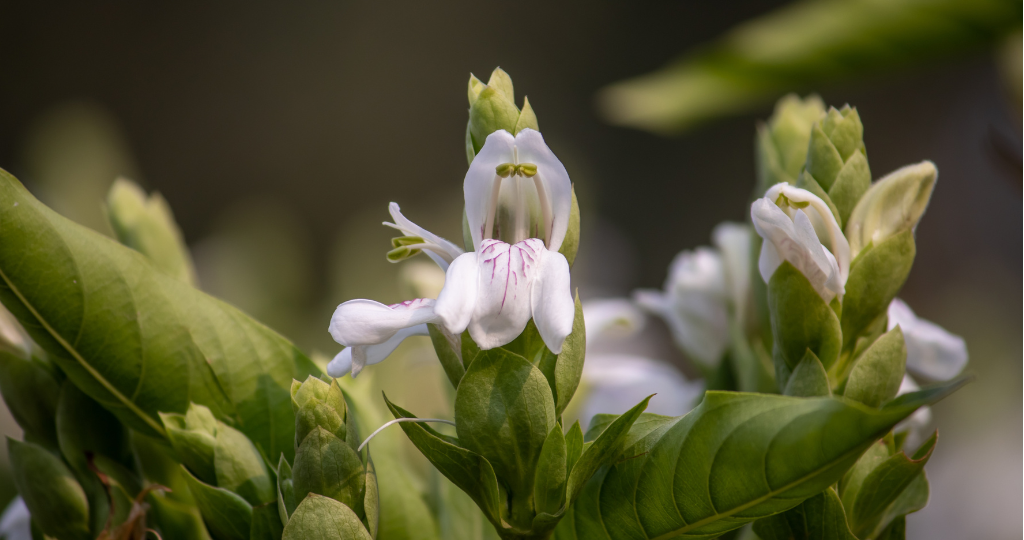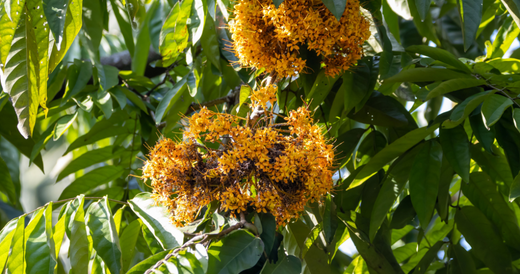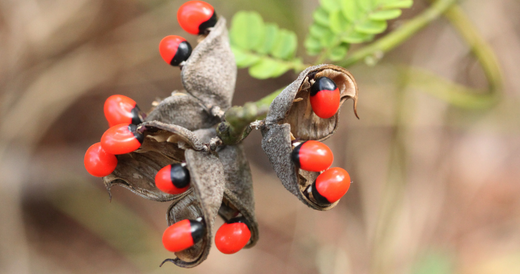
Ratti [Rosary Pea] Complete Guide to the Ayurvedic Herb
An Introduction to Ratti Plant
The Ratti plant is a unique flowering shrub native to tropical regions of Southeast Asia. Recognizable by its bright purple bell-shaped flowers and glossy oval leaves, the Ratti plant has long been prized in traditional herbal medicine for its soothing properties. While modern research on the plant is limited, small studies suggest extracts may have anti-inflammatory and anxiety-reducing effects.
- Hindi Name: Ratti
- Sanskrit Name: Gunjaa
- English Name: Rosary Pea
- Latin Name: Abrus Precatorius
10+ Evidence-Based Advantages of Ratti Plant
- Rich in antioxidants that may protect cells from damage and lower inflammation
- Compounds may reduce anxiety, alleviate stress, and boost mood
- Possible antimicrobial effects to fight bacteria, fungi, and other microbes
- Extracts demonstrate antitumor abilities in lab studies on certain cancer cells
- Reduce high blood pressure in early animal studies
- Traditionally used to treat digestive issues like nausea and stomach pain
- Preliminary evidence of neuroprotective qualities to support brain health
- It contains choline to support liver function and fat metabolism
- Antihistamine effects may relieve allergic reactions and skin irritation
- Nutrients like vitamin C and iron support immune defense and oxygen circulation
- Has antidiabetic effects to lower blood sugar
- Used in skincare routines due to antioxidant and anti-inflammatory activities
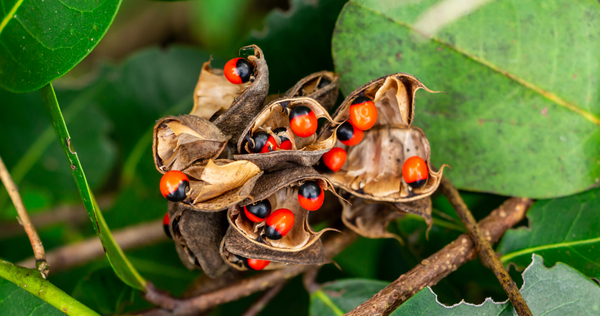
Source: Canva
1. Ratti to lower inflammation
Gunja plant exhibits anti-inflammatory properties, helping to ease swelling and discomfort. Its natural compounds work synergistically to combat inflammation, promoting overall well-being.
2. Ratti to reduce anxiety, alleviate stress
The calming effects of Ratti contribute to stress reduction and anxiety relief. By influencing neurotransmitters, it helps create a sense of calm, fostering mental relaxation.
3. Ratti for reducing high blood pressure
Gunja plant is linked to blood pressure regulation. Its properties support vascular health, potentially aiding in managing high blood pressure for improved cardiovascular well-being.
4. Ratti to reduce high blood pressure
With its beneficial effects on blood vessels, Ratti may contribute to lowering high blood pressure, promoting cardiovascular health, and reducing the risk of associated complications.
Other Plants
5. Ratti for digestive issues
Ratti aids in digestive health by soothing the digestive tract. It helps alleviate discomfort, promotes healthy digestion, and may assist in mitigating common digestive issues for overall gastrointestinal well-being.
6. Ratti for liver function and fat metabolism
Abrus seeds support liver function and enhance fat metabolism. Its natural compounds work to optimize liver health, aiding in the breakdown of fats and promoting a healthy metabolic balance.
7. Ratti to relieve allergic reactions and skin irritation
Ratti's anti-allergic properties can help alleviate skin irritation and reactions. It may relieve allergic responses, whether applied topically or consumed, promoting healthier skin.
8. Ratti for immune defense and oxygen circulation
Ratti plays a role in supporting the immune system and enhancing oxygen circulation. By bolstering the body's defense mechanisms, it contributes to overall well-being and vitality, ensuring optimal oxygen delivery to cells.
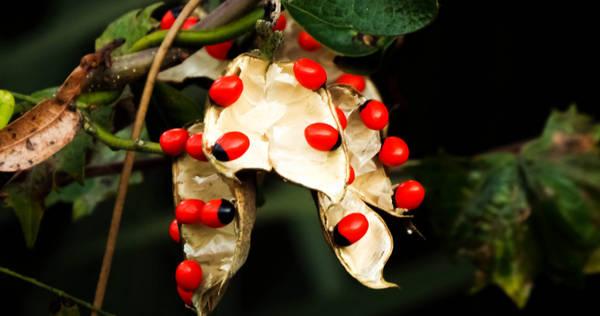
Source: Canva
How Does Ratti Work for Health Issues?
The Ratti plant works wonders for various health issues through its diverse medicinal properties. Its anti-inflammatory nature aids in lowering swelling, while its calming effects reduce stress and anxiety. Ratti supports cardiovascular health by regulating high blood pressure and optimizing blood vessel function.
For digestive well-being, it soothes the digestive tract and aids in digestion. Additionally, its impact on liver function and fat metabolism promotes metabolic balance. With anti-allergic properties, Ratti alleviates skin irritation, and its immune-boosting qualities enhance overall health by supporting the body's defense mechanisms and optimizing oxygen circulation to cells.
Other Plants
Top Ways You Can Use Ratti
The following are the ways you can use Ratti:
- Ratti Tea
- Ratti Supplements
- Ratti essential oil
Demystifying The Top Ratti Myths and Ratti Facts
Here's presenting the myths and facts associated with Ratti:
Facts About Ratti
- Ratti is a tropical flowering shrub native to Southeast Asia, recognizable by its vivid purple bell-shaped blooms and glossy green leaves.
- Used for centuries in traditional medicine, the leaves, roots, stems and flowers are all used to create herbal infusions, tinctures, powders and more.
- Research shows the plant has antioxidant, anti-inflammatory, antimicrobial and antiviral properties from compounds like flavonoids, terpenoids and phenolic acids.
- In preliminary studies, Ratti extracts have reduced anxiety, eased depression, lowered blood pressure, and shown antitumor effects against certain cancer cell lines.
- Unlike some sedatives, Ratti has not demonstrated addictive qualities or harsh side effects, though more research is still needed.
- The vibrant tropical shrub can grow in warm greenhouse environments with the right humidity, lighting and heat, even in non-tropical regions.
Myths About Ratti
- Ratti is a tropical species that cannot tolerate cold climates
- The purple flowers are the only part used therapeutically
- Ratti plant compounds are too mild to have potent effects
- Ratti mainly treats anxiety and insomnia
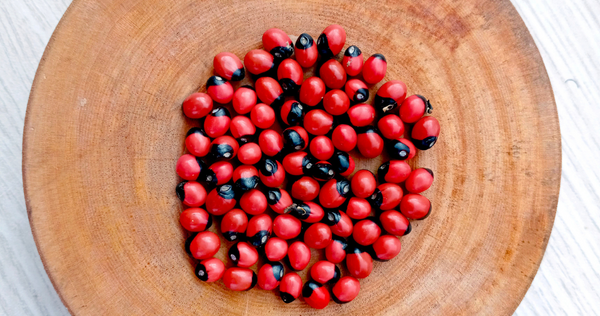
Source: Canva
Tips on Growing Ratti at Home
Growing Ratti at home can be a rewarding experience. Begin by selecting a well-draining pot and filling it with nutrient-rich soil. Plant Ratti seeds or a seedling in a sunny location, ensuring it receives adequate sunlight. Water the plant regularly, keeping the soil consistently moist but not waterlogged. Consider using organic fertilizers to boost growth. Prune the plant to encourage bushier growth and remove any dead leaves. With proper care, your homegrown Ratti can thrive, providing a fresh and natural source of this beneficial plant for various health applications.
Our Thoughts
The Rosary Pea, known as Ratti, is a versatile Ayurvedic herb with many health benefits. From its anti-inflammatory and stress-relieving properties to its potential to promote cardiovascular health and aiding digestion, Ratti is a valuable addition to holistic well-being.
As with any herb, it's essential to appreciate its potency and integrate it mindfully into health practices, seeking guidance from Ayurvedic experts for optimal utilization and benefits.
FAQs
Q1. What health benefits does Ratti offer?
Ratti has been used in Ayurvedic medicine to alleviate anxiety and depression, reduce inflammation, relieve pain, support digestion, and more. The herb contains plant compounds that may be neuroprotective, antioxidant, and tumor-combating.
Q2. Is it safe to consume Ratti?
Ratti is generally safe to use when appropriately prepared by following traditional Ayurvedic methods. However, the raw plant has toxins, so proper processing like drying, cooking, or fermenting, is vital before ingesting.
Q3. What’s the best way to take Ratti?
Ratti can be enjoyed as a hot or iced herbal infusion, powdered and put into capsules, distilled into essential oils or liquid extracts made with alcohol/glycerin, prepared as an external poultice, and more. Combining with other herbs may enhance benefits.
Q4. What are the side effects?
Research suggests that when used properly, topically or orally consumed Ratti has few side effects for most people. As an herb with sedative properties, some notice potentiated drowsiness or nausea when mixed with other medications/substances.
Q5. Can you grow Ratti at home?
While native to tropical climates, Ratti plants can be successfully container grown in warm greenhouses to produce leaves/flowers year-round. They require lots of light and adequate moisture, especially in non-tropical regions.
Q6. Is Ratti effective for helping sleep?
Due to traditional use as a nighttime sleep aid, Ratti continues to be explored for insomnia relief. Compounds may mildly sedate the nervous system and promote relaxation without excessive drowsiness during daylight hours. More studies are still needed.





